Iranian Rapper Charged With Spreading “Corruption on Earth”
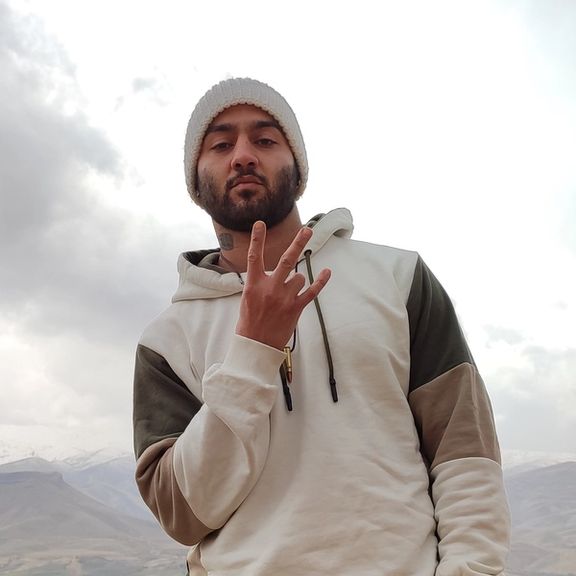
Chief Justice of Iran’s Esfahan province says dissident popular rap singer Toomaj Salehi has been accused of “corruption on earth” which may carry the death penalty for him.

Chief Justice of Iran’s Esfahan province says dissident popular rap singer Toomaj Salehi has been accused of “corruption on earth” which may carry the death penalty for him.
Asadollah Jafari on Sunday said Toomaj Salehi faces other charges, including “propaganda activity against the establishment, forming an illegal group with the intention of disrupting the security of the country, cooperating with hostile governments, and spreading lies and inciting others to commit violence.”
However, Jafari said no court has been held for the rap singer yet. Toomaj Salehi was detained in late October after criticizing the Islamic Republic and expressing solidarity with the protest movement after the death of Mahsa Amini in police custody.
This comes as sixteen UN-appointed independent human rights experts urged the Iranian government to stop using the death penalty as a tool to punish protesters.
A US-based human rights group said on Saturday that Toomaj Salehi's trial had begun “without an attorney of his choice,” and his family said his “life is in danger.”
Earlier this month, 126 musicians, poets, artists, and activists called for his release.
Salehi’s arrest came shortly after his interview with the Canadian Broadcasting Corporation, saying that “You are dealing with a mafia that is ready to kill the entire nation... in order to keep its power, money and weapons.”
In his politically charged songs such as “Buy a Rat Hole”(2021), Toomaj, a 32-year-old metalworker in Esfahan, spoke out against repression, injustice, poverty, and authorities’ own corruption and impunity from prosecution.
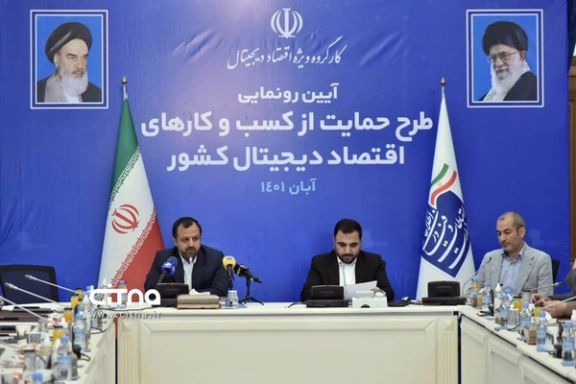
Amid internet shutdown to prevent spread of information about the ongoing protests, the Islamic Republic plans to provide high-speed internet to "accredited” digital businesses.
The frequent government shutdown of internet access has caused serious disruption for individuals and small businesses based on digital sales and marketing.
The new measure, dubbed “Regulations to support freelancers active in the country's digital economy," was ratified by the government’s digital economy taskforce on Saturday in 10 articles, which probably will lead to strict monitoring of online activities and ensuring that regime supporters have internet access.
The use of the term ‘freelancer’ might be misleading. The definition in the regulation points to individuals or companies that apply as active in digital economy and approved by the government.
Headed by Communications and Information Technology Minister Issa Zarepour, the taskforce was established last year to coordinate the government’s supervision on online activities among four ministries.
It defines a freelancer and its range of services, includes instruction on how to create a database of digital ‘freelancers’, sets criteria on their accreditation and how government institutions should interact with them, as well as some insurance and financial matters.
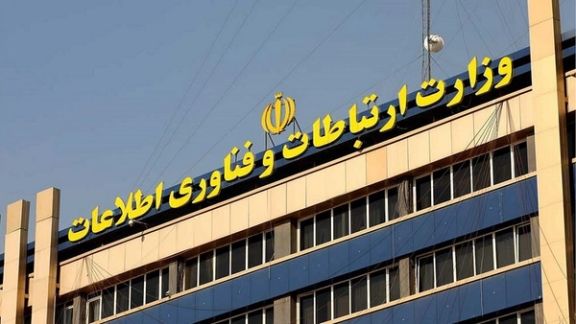
According to the new regulations, the computer trade union has been tasked to set up a database of ‘freelancers’ and their activities within three months.
In its article 8, the Ministry of Information and Communications Technology has been tasked with providing the necessary infrastructure for “high-speed and stable Internet with appropriate level of access for accredited people," without clarifying on the “appropriate access” or who are the “accredited people.”
In another article, the government claims that in order to supervise the “fairness and transparency” of the contracts between freelancers and employers, instructions have been issued for monitoring software platforms. According to the document, the regulations for accreditation into the database will be announced by the ministry upon collaboration among Ministry of Information and Communications Technology, the country's computer trade union organization; Ministry of Cooperatives, Labour, and Social Welfare; Ministry of Culture and Islamic Guidance; the presidential office of Science and Technology and Knowledge-Based Economy; and last but definitely not least the Intelligence Ministry.
Many Islamic Republic officials, such as member of the parliament Javad Hassanikia and former Information Minister Mohammad-Javad Azari Jahromi, have talked about providing internet access to university professors or journalists. The move can be a measure to justify replacing the country’s internet with an intranet for the general population who will be disconnected from the world wide web and controlled by the regime’s limited domestic access. Azari-Jahromi was one of the main supporters of the idea of stratifying Internet access inside the country. In an address to the parliament, he defended the idea saying it is not possible to provide the same type of internet to all jobs and ages in the country.
Like almost all measures by the Islamic Republic that sound innocent but pursue ulterior motives, the new move is titled “regulations to support freelancers” but is meant to suppress any critical voice and cajole those who want normal access to the internet to be on the regime’s side. It means that if you want to have access to the internet, the government should be able to monitor your work and make sure you do not engage in any activity or cooperate with anyone the regime deems hostile.
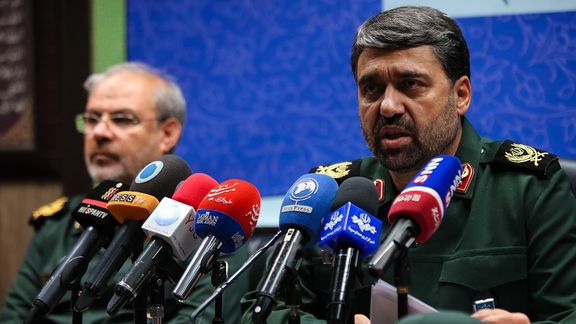
Documents obtained by Iran International show Iran was coordinating secret efforts with Qatar to control who attends the World Cup and restrict any signs of dissent.
Black Reward, a hactivist group that found access to Fars News Agency files this week provided an audio tape of a meeting between a Revolutionary Guard general and a group of media managers or representatives from outfits affiliated with the IRGC about plans to use the sporting event to the benefit of the regime in Tehran.
A six-minute audio segment of a tape features General Ghasem Ghoreyshi (Qasem Qoreyshi), deputy commander of the paramilitary Basij and a group of reporters including the one from Fars News who met with him possible in the presence of other trusted reporters to discuss the latest developments including plans for the World Cup.
The meeting took place on Tuesday 15th of November.
Ghoreyshi starts by saying that “anti-revolutionaries” have bought “5,330 tickets” to the tournament and adds that “our boys have checked the list of the ticket holders and at least 500 people” are known opponents of the Iranian regime.
This is the first piece of evidence of collaboration with Qatar, showing that Iran obtained the list of ticket buyers most probably from Qatari authorities.
The Fars representative then asks the General if it is true that Iran’s intelligence ministry had asked Qatar to cancel these tickets. Ghoreyshi says that “Qatar has two different conducts with us – one is a positive response, and it has promised to do that [cancel tickets], but usually they don’t fully deliver. They told us give us the names [of unwanted people], and we will solve the issue.”
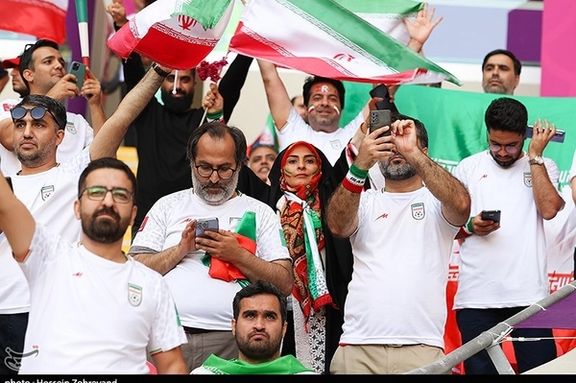
Ghoreyshi goes on to say that Qatar also sometimes does not cooperate. At this point he mentions the example of Iran International, saying Qatar asked Iran to provide documents if it wanted the television network to be banned from the World Cup. He then complains that the host country has not still done so. The reporter interrupts telling the General that just the day before, Iran International announced that its reporters have been denied permission to cover the games. Ghoreyshi, who was apparently not aware, shows his surprise and says that Iran discussed the issue with Qatar “the day before”.
In mid-November Iran International announced that Qatar revoked permission for its reporters and TV crew to travel to the country and cover the World Cup. The denial of permission after initial agreement came without an explanation.
Ghoreyshi admits that Iran provided Qatar with “films” related to protests, as documents needed to ban Iran International. These presumably were user-generated videos from the protests that Iran International aired, as did other foreign-based Persian broadcasters.
He goes on to say that Qatar has even promised to control spectators inside the stadiums, not allowing Iranian flags other than the Islamic Republic flag to be displayed.
This is exactly what happened once the games started. During Iran’s second match against Wales on November 25, Iranian fans, who wanted to take flags other than the official one approved by the Islamic Republic to the Al Rayyan’s Ahmad bin Ali Stadium, were stopped by security officers. Many people were barred from carrying or waving Iran’s ancient flag with the Lion and Sun emblem or a simple three-color flag with the main motto of the current wave of protests – Woman, Life, Liberty. Some were even detained for hours by Qatari police.
All this was because of the regime’s concern over dissident Iranians manifesting antigovernment signs and actions that people back in Iran could see on television. Nevertheless, many did chant and boo when the Islamic Republic anthem was played in the stadiums.
This fits into the rest of the conversation in the tape obtained by hackers. The conversation between the IRGC general and reporter(s) reveals an elaborate plan by the Islamic Republic to use the World Cup event in Qatar to win political points amid popular protests.
Ghoreyshi then explains that the government is paying the expenses of its supporters to go to Qatar to attend Iran’s games and show that the Islamic Republic enjoys support.
In fact, images from the stadiums show hundreds of government officials, influential people from the regime’s inner circle, including journalists working for hardliner media in attendance.
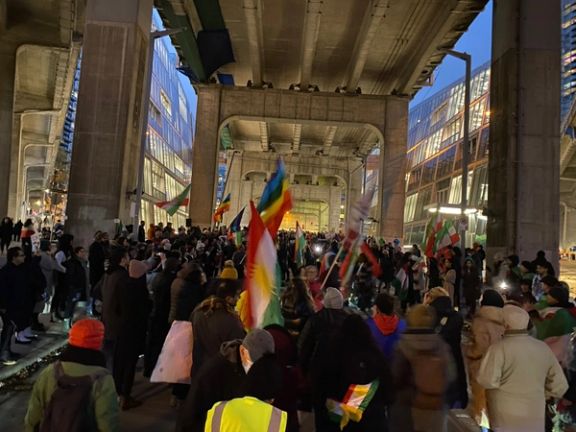
CBC Canada has reported that an increasing number of Iranians living in Canada have expressed their concern that they are being followed and threatened by regime agents.
Based on the report, elements of the Islamic Republic living in Canada have threatened Iranians, monitored them, and even chased them to their homes after demonstrations in Canadian cities.
The activists told CBC they have had no help from Canadian police or government officials and do not feel like the threat is being taken seriously.
The report also added that the agents of the Islamic Republic have threatened Iranian Canadians through calls and text messages to cell phone numbers that were supposed to be private.
The messages warned them to stop posting on social media and speaking out about Iran.
Canadian Security Intelligence Service (CSIS) had earlier acknowledged that they are monitoring the situation, announcing for the first-time last Friday they are investigating “several threats to life emanating from the Islamic Republic of Iran.”
CBC said last Friday that Canadian Security Intelligence Service was aware that some state agents of the Islamic Republic are “monitoring and intimidating” people inside Canada to silence those who speak against the regime.
Since popular protests started against Iran’s clerical regime, activists and Iranians living in Canada have held large gatherings and demonstrations in Canadian cities in solidarity with the protesters inside the country.
Meanwhile, many activists are preparing various lists of people affiliated with the Islamic Republic and living in Canada to present to the authorities.

Research has revealed that security forces in Iran widely used shotgun cartridges manufactured by a European company against unarmed protesters, killing and injuring dozens.
An investigation published by the FRANCE 24 Observers showed that the cartridges made by French-Italian manufacturer Cheddite have been used to crack down on demonstrators in Iran.
To conduct the investigation, the team called on Iranians to send photos of ammunition recovered from protests after the death of Mahsa Amini on September 16.
Over 100 photographs and videos showing tear gas canisters, rifle bullets, paintball projectiles and cartridges from shotguns which have been widely used by Iran’s security forces have been analyzed by the team.
While most of the shotgun shells photographed were made in Iran, 13 shells recovered from eight different Iranian cities bore Cheddite logos, says France 24.
Cheddite has factories in Italy and France, with headquarters in Livorno and Bourg-lès-Valence. The company claims to be the world’s largest maker of empty shotgun cartridges and firing caps, producing more than a billion empty cartridges every year.
While the Islamic Republic is under an arms embargo, the use of ammunition made by two Western countries by its security forces has raised the question of how these bullets reached Iran. Such transactions are considered a clear violation of EU laws.
EU Council Regulation passed on April 12, 2011, prohibits the “export, directly or indirectly, [of] equipment which might be used for internal repression” in Iran, including “firearms, ammunition and related accessories.”
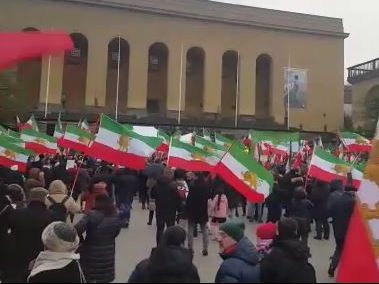
The situation in Iran remained tense Saturday as people closed their businesses to show support for protests and students held sit-ins at different universities.
Following the publication of a joint call by seven universities in Tehran to hold gatherings in support of the people of Kurdish regions, the students of Amirkabir, Tehran, Sharif, Beheshti, and some other universities staged sit-ins and strikes.
The student gatherings were held to protest the killing of people in the Kurdish regions of Iran, the arrest of students, and to show support for antigovernment demonstrators.
Workers also played their roleagain to help the protest movement. Reports say the Truck Drivers’ Union called for a nationwide strike while workers at steel and automobile factories also stopped work on Saturday.
Workers at Esfahan Steel Company, Alvand SarmaAfarin Incorporation, Morattab Car Manufacturing, Safe Khodro Car Manufacturing Company, Qazvin’s Pars Appliances Company, and some others staged strikes during the day.
Esfahan Steel Company is a parent corporation with four thousand employees and a producer of construction steel and rails.
The Free Workers' Union announced that welding workers went on strike at Bafaq Steel Complex in Kerman province in central Iran in protest to non-observance of safety measures that led to an explosion and the death of two of their colleagues.
People protesting in the Sattar Khan district of Tehran Saturday evening
In addition to Tehran there were reports and videos of protests in the central city of Esfahan.
A promising news was that Hossein Ronaghi, the imprisoned civil activist, was released from prison on bail and taken to hospital. The dissident blogger and freedom activistwas arrested over his support for protests late in September, and prison guards broke his legs in detention.
He was arrested several times in the past decade and staged hunger strikes in prison. Ronaghi was first arrested along with his brother Hassan in the aftermath of the disputed presidential elections in 2009 for helping journalists and political activists to circumvent internet censorship. He was also charged with insulting Supreme Leader Ali Khamenei in his blog posts.
Some state media also reported the release of popular Iranian football player Voria Ghaffouri, who was detained by security forces this week after his critical statements regarding the behavior of the Iranian national team members, criticized for not showing any support for protesters and the families of victims killed by security forces.
However, IRNA news agency denied the reports of his release citing “informed sources.”
In the meantime, hundreds of Iranians abroad expressed support for their fellow countrymen by taking into streets in different cities around the world.
As in the past two months, protest rallies were held today in Paris, Milan, Istanbul, Stockholm, Gothenburg, Malmö, Berlin, Frankfurt, Aarhus, Budapest, and more.
The protest rally of Iranians in Milan coincided with the International Day for Prohibition of Violence Against Women.
Protesters chanted slogans against the Islamic Republic and demanded an end to the killing of women and children in Iran.
Iranians living in Stockholm, Sweden also gathered in front of the Swedish Parliament to show solidarity with Iranian Kurds and to protest the killings and repression in Kurdish regions.
Hundreds of Iranians living in Istanbul also held a gathering along with a group of women's rights activists.
In this rally, which was held to express solidarity with the Iranian people, the protesters chanted slogans like “From Istanbul to Tehran, I sacrifice my life for Iran” and “Death to Khamenei.”